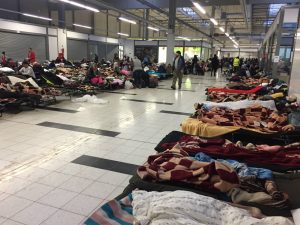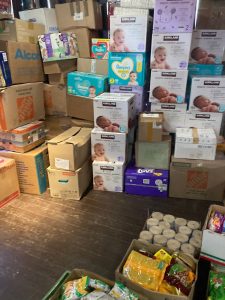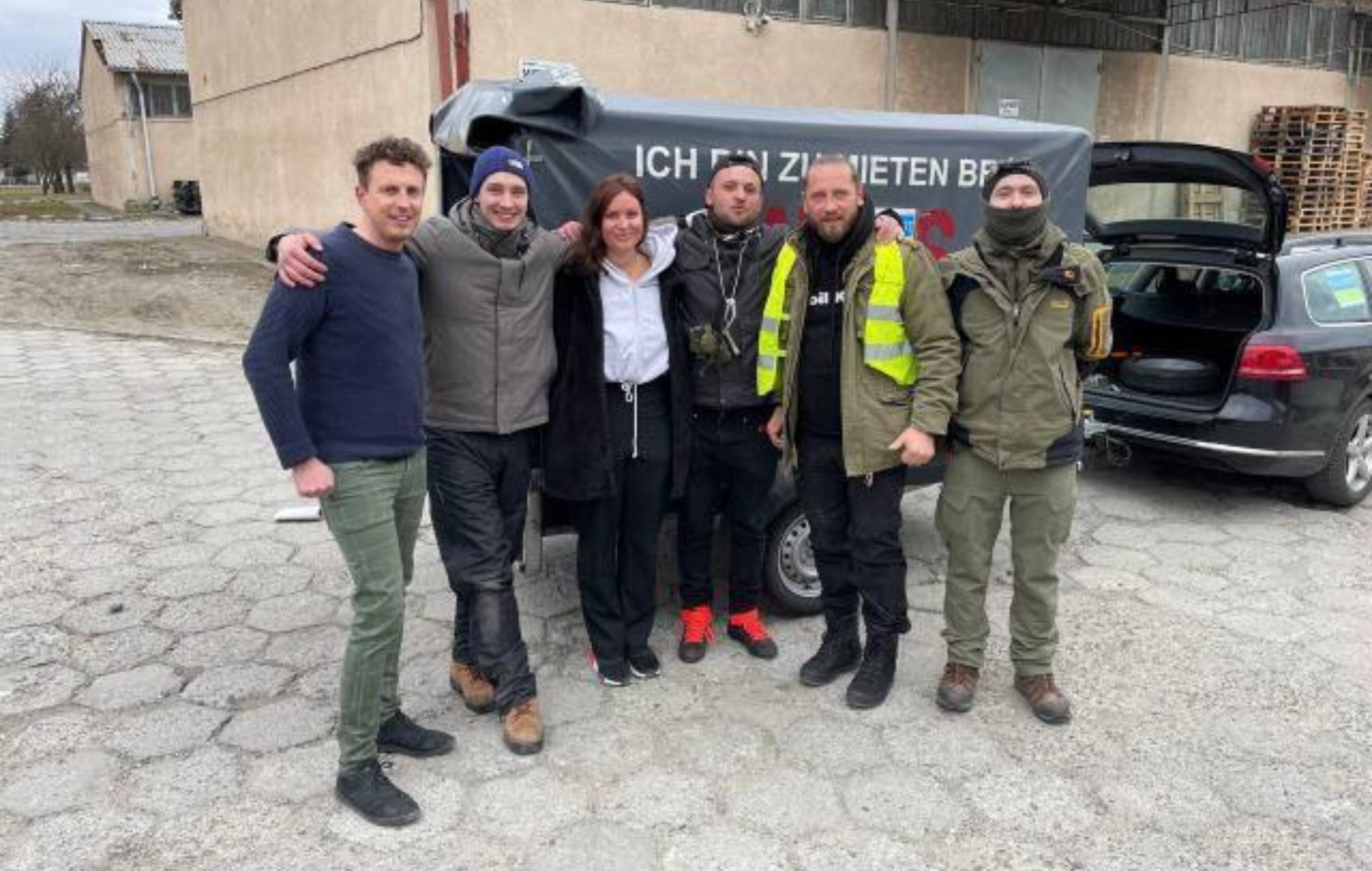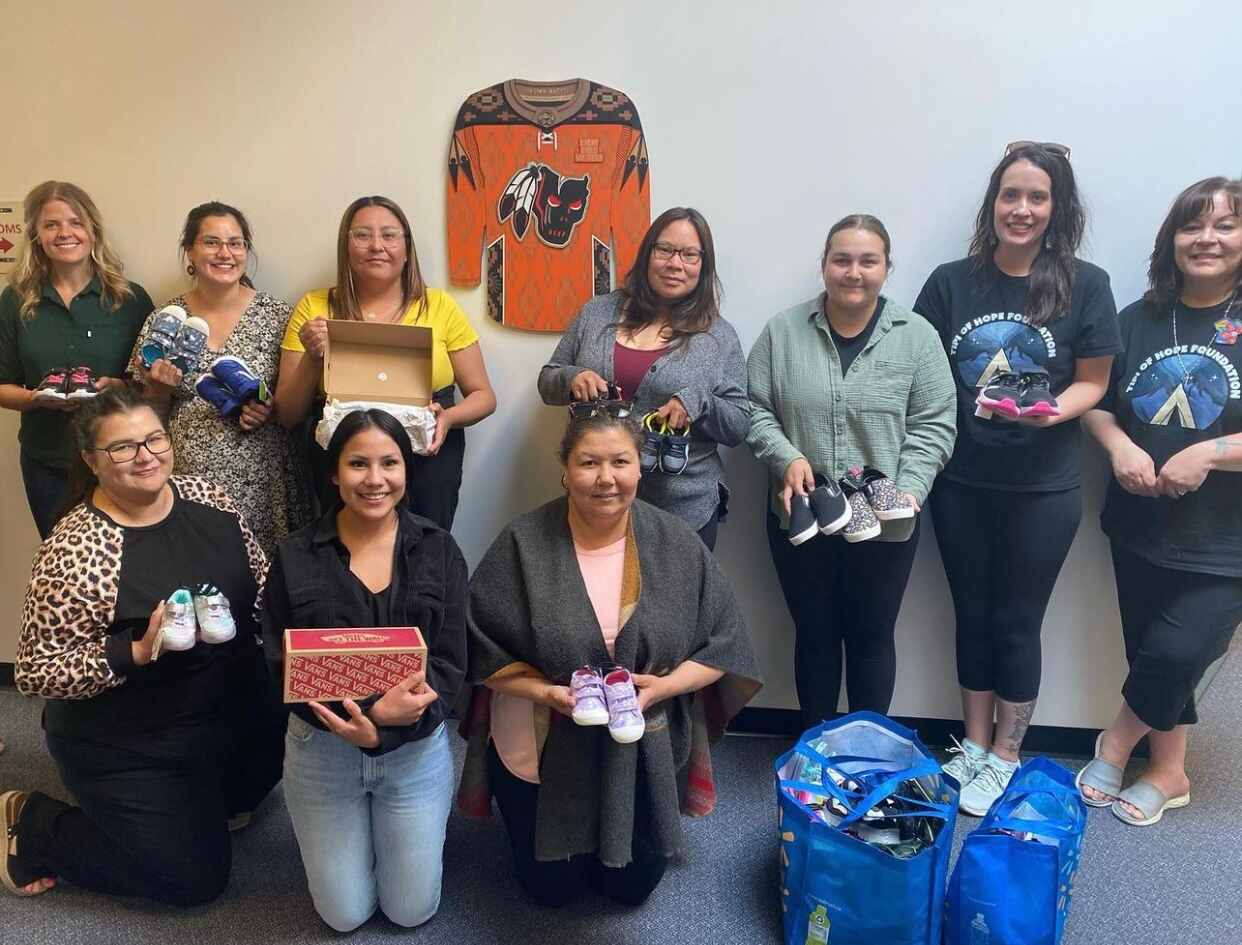This blog post was written by Ryan Grant Little, co-founder of CanadaHelps who is currently working across Europe as well as on the ground in Ukraine, supporting the ongoing crisis.
Ryan cofounded CanadaHelps more than 20 years ago with co-founders Aaron and Matthew in large part because he wanted to create a way for Canadians to react with our world-renowned generosity with immediacy and accountability.
On February 24th 2022, when Russia invaded Ukraine, I felt an intense need to spring into action. These days I live in Vienna, Austria, where driving to the Ukraine border takes about the same time as driving from Toronto to Montreal—well, depending on the traffic on the 401!
In that first week of the invasion, I was sure of two things:
- That there would be a lot of Ukrainians defending their country under-equipped in sneakers, jeans, and baseball caps
- That there would be a crush of refugees trying to get to a safe place.
I also remembered that my VW Passat station wagon—which makes up in functionality what it lacks in cool—has a hidden trailer hitch.

That first weekend I rented a trailer and headed to an outdoor supply store. I bought everything they had in camouflage and green, every pair of boots, every mat and tarp. The bill ran up to the equivalent of $35,000, and I had to have friends show up to split it across half a dozen credit cards. Later, I would reach out to friends and family in Canada to ask if they’d like to chip in and their generosity was incredible. Through them, I’ve been able to raise more than $150,000 to fund direct work like this since that first trip.
I filled the trailer and headed for the Polish-Ukrainian border, to a town I still can’t pronounce: Przemyśl. Through Ukrainian friends, I’d found a contact there who would load the gear onto a tractor-trailer headed to Lviv. From there it would be distributed to Territorial Defense Forces soldiers, the newly minted home guard that was filling its ranks by the thousands each day.
How to help Ukrainians heading into winter:
Here in Europe, we are being warned that household gas bills that were the equivalent of $150 per month could hit $1,500 per month, in part due to gas shortages from fuel supply storage facilities being destroyed in the war and Europe’s dependency on Russia for oil and gas1. Not to mention, Ukrainians in areas left with no gas supply are now having to decide between leaving their homes or buying expensive firewood (if they can afford it), despite resources available exceeding demand. The situation in Ukraine will only get worse as we head into sub -25 C weather this winter.
With donations and awareness of the humanitarian crisis in Ukraine dropping off precipitously in the last couple of months, now, more than ever we need to help. Here are some meaningful ways you can help:
1. Donate food & water but especially clothes
While governments are shipping artillery and planes, many—not all, but many—soldiers are still fighting on the front lines in sneakers, jeans, and baseball caps. Rather than making physical donations, Canadians can give to a charity that will provide jackets, sweaters, gloves, hats, and other winter garments to people in Ukraine, including vulnerable children, will help them get through the winter.
Support responders on the ground that are providing essentials like food, water, shelter, and more:
- Canadian Red Cross: Ukraine Humanitarian Crisis Appeal
- Canadian-Ukraine Foundation: The Ukraine Humanitarian Appeal
- Action Against Hunger: Ukraine Emergency Appeal

2. Help get medicine to refugee camps & the frontlines
Hospitals and medical care services are running low on supplies needed to treat wounded and injured patients as well as soldiers on the front lines. I’ve seen some treating casualties with expired paracetamol, or often nothing at all.
Without medicines to prevent infections and provide pain relief, people in Ukraine will experience even more suffering.
Support charities providing medical aid to refugees displaced in Ukraine and in neighbouring countries:
- GlobalMedic: Ukraine Conflict Response
- Help Partners International (HPIC): Response in Ukraine
- Help Us Help: Ukraine
- Markham Rotary Club Foundation: Medical supplies to Ukraine
- Canadian Ophthalmological Society Foundation: Supplies for Ukraine ophthalmologists
- Children Believe Fund: Emergency aid to Ukrainian children & families

3. Support marginalized communities in Ukraine
Between the end of February and May is when the refugee crisis was at its most intense, with an estimated six million displaced people crossing into Europe. During this time we worked 60-80 hour weeks, running multiple trips to and from the Ukrainian borders with Poland, Slovakia, and Hungary.
Together we helped set up and support refugee centers for the people who were having an especially hard time, like People of Colour, Roma, LGBTQ+, and disabled refugees. I lowered the back seats of my car, installed an air mattress, bedding, and first aid kit and focused transportation efforts on disabled or wounded refugees who couldn’t travel by bus.
Donate to charities helping marginalized, vulnerable, and isolated communities in Ukraine including seniors, women and girls, people with disabilities, and more.
- HelpAge Canada: Humanitarian Response for Older People and their Families and Communities in Ukraine
- CARE Canada: Ukraine Crisis Response Fund
- TDH Canada: supporting orphanages in Ukraine
- Canadians Sharing Locally and Globally: Ukranian Orphanage Emergency Relief Fund
- Handicap International: Ukraine Emergency
- Save The Children: Ukraine Crisis Appeal
- SOS Children’s Villages Canada: Ukraine Humanitarian Response

4. Close the housing gap for Ukrainian refugees
Offer a home-stay for refugees
When I first arrived in Ukraine I asked where the closest refugee center was and was directed to a converted shopping mall. I wasn’t ready for this: so many women and children on cots or on the floor, separated from their loved ones, not knowing what happens next. There was a boy, maybe 10 years old, on his own except for his dog. We tried to speak a few words though we couldn’t understand each other, and it was simply heartbreaking.
I walked around with my Google-translated sign reading “Vienna” and was tapped on the shoulder by a woman named Olga, there with her daughter Anastasia. After a speakerphone-interpreted conversation with a Ukrainian friend of mine, they decided to make Vienna their new home—and their first trip outside of Ukraine. Olga and Anastasia would stay in my home for about a month, and they are still in Vienna today in their own apartment. We meet at the dog park from time to time, to catch up with me and—more importantly—Gracie, the dog they have come to love.

Support organizations helping rebuild or rehouse refugees
While people in bordering countries have supported refugees from Ukraine by providing short term housing, there are far more people that need resources to resettle and rebuild their lives in cases where they may not be able to return to their homes. From Canada, you can donate to charities that are sponsoring Ukrainian refugees and helping them set up their lives here or organizations that are on the ground helping rebuild vital infrastructure in Ukrainian communities.
Donate to charities helping refugees in Ukraine and neighbouring countries find temporary shelter, resettle, and more:
- Good Neighbors Canada: Ukraine Crisis Appeal
- UNHCR: Ukraine Emergency
- Plan International: Ukraine Emergency Appeal
- United Nations Association in Canada: Ukraine Refugees Fund
- S.O.S Ukraine: Ukrainian Refugee Relief
- Saskatoon Open Door Society: Ukrainian Refugee Relief
- ADRA: Crisis in Ukraine

5. Read reputable news sources & continue to stay informed on the Ukraine-Russia conflict
As I’ve experienced so many times in the last months— the people of Ukraine maintain their impeccable sense of humour even in the direst of circumstances. But make no mistake: they will need the unwavering support of the West to make it through the war. As the war in Ukraine gets pushed out of the news cycle, by keeping Ukrainian relief efforts top of mind and staying informed through reputable sources, you can help make sure the people of Ukraine are not forgotten. Here are some questions to ask yourself as you are reading news2:
- Source: Who or what is the source?
- Motive: Why do they say what they do?
- Authority: Who wrote the story?
- Review: Is there anything included that jumps out as potentially untrue?
- Two-Source Test: How does it compare to another source?


There are dozens of charities that are working to provide critical supplies like food, water, clothes, and shelter throughout the war in Ukraine as well as refugees who have fled with the bare essentials needed to survive. Your support will provide hope to millions of Ukrainians, including children, to make it through the winter.
If you have the desire and means to make direct contributions on the ground, please contact Ryan Grant Little who is working tirelessly to send supplies to the people in Ukraine who need it most.
References
1 World Economic Forum, March 2022, https://www.weforum.org/agenda/2022/03/eu-energy-russia-oil-gas-import/
2 University Libraries, University of Washington, Sept. 2022, https://guides.lib.uw.edu/research/faq/reliable
Updated on November 4, 2024
Donate Now




